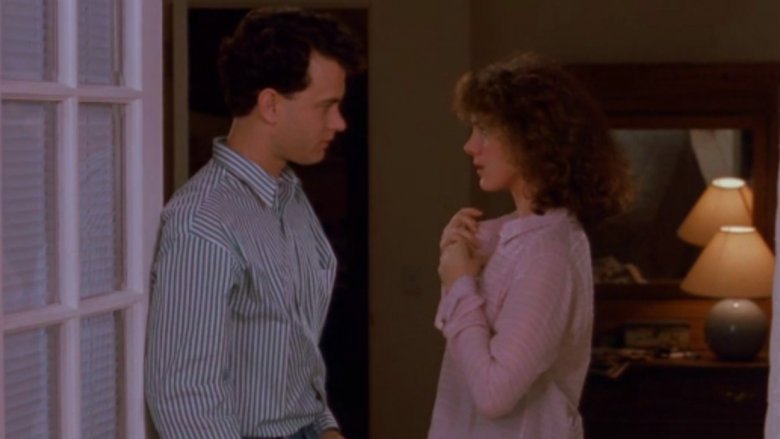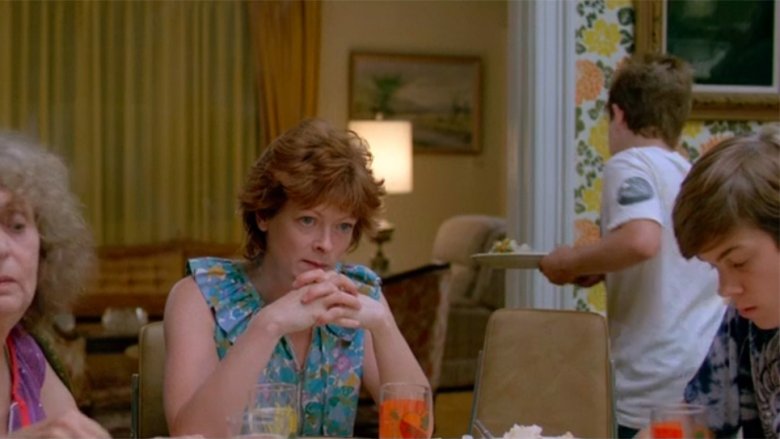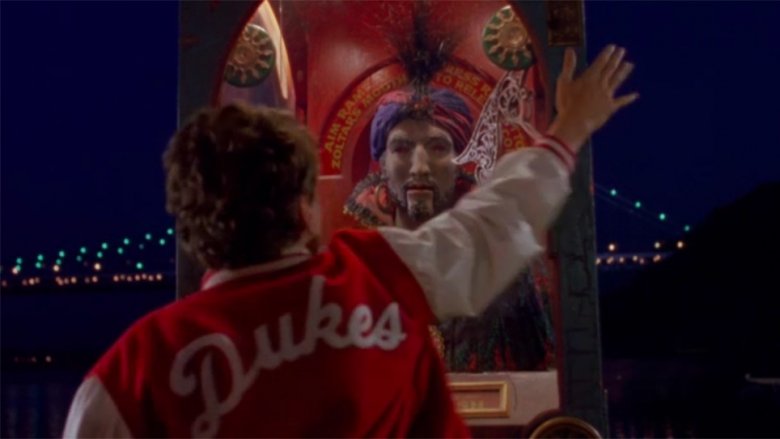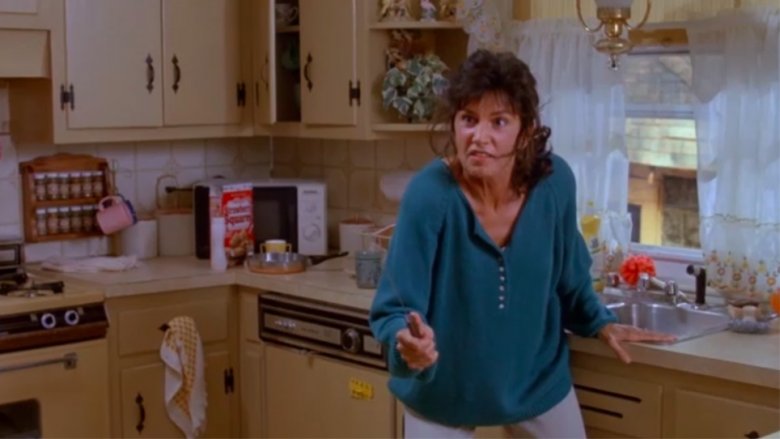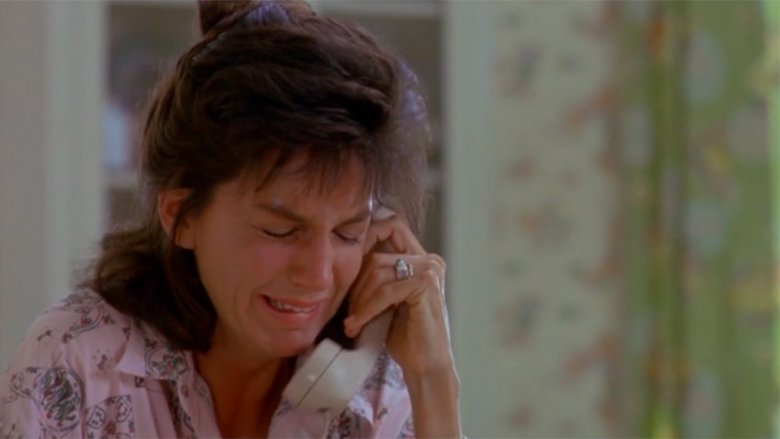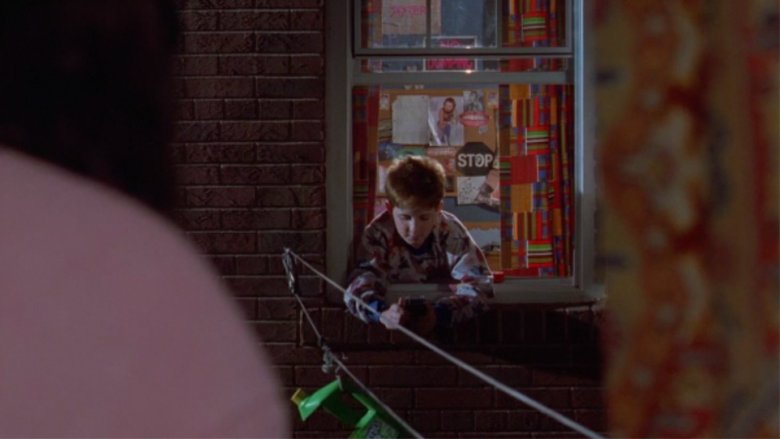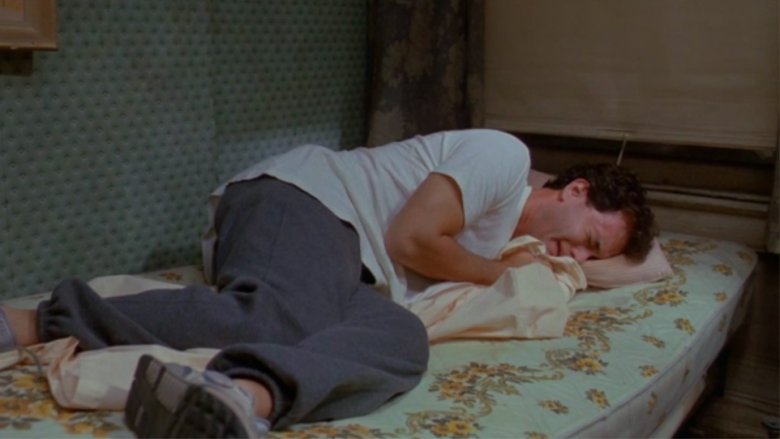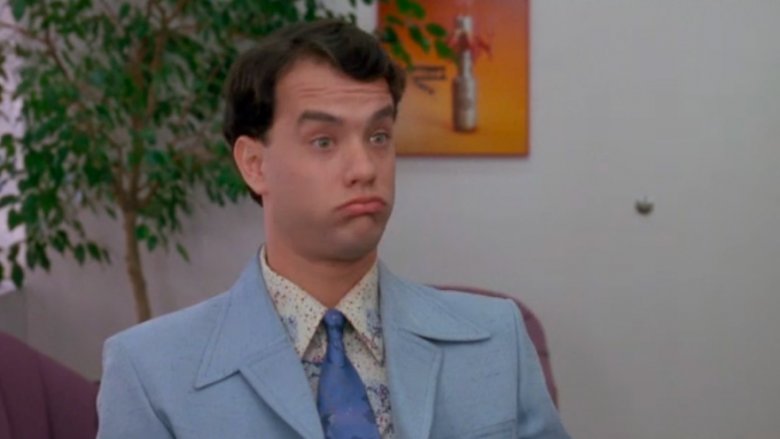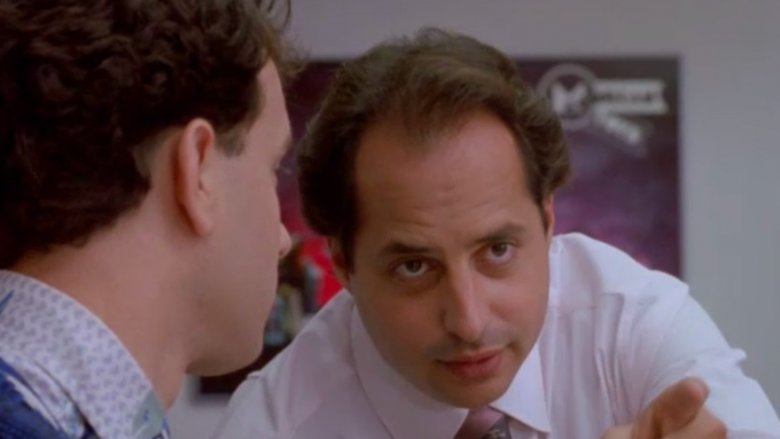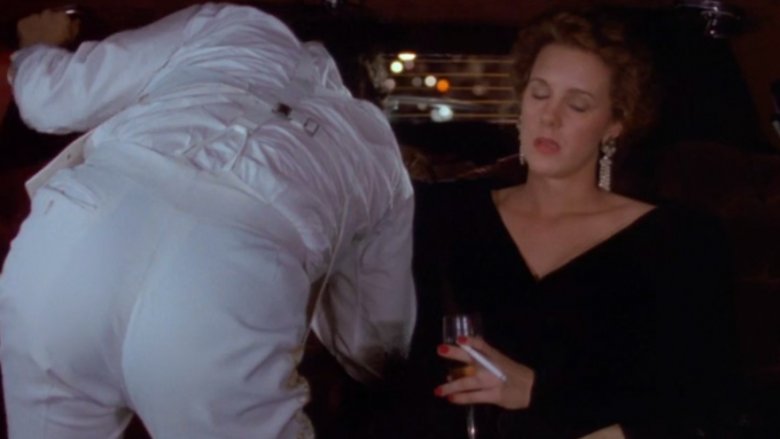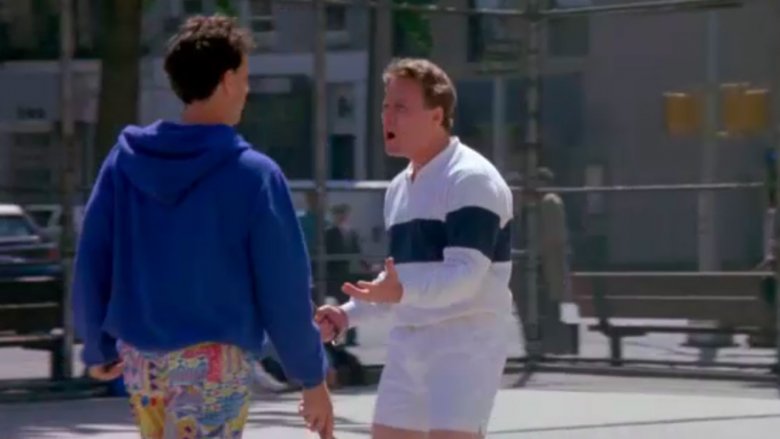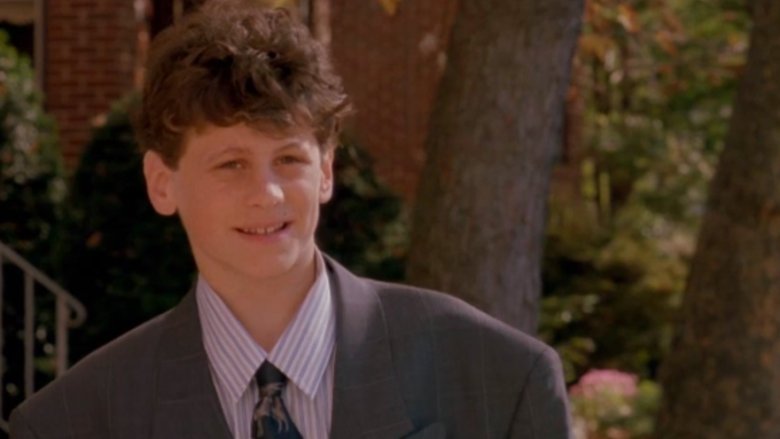The Darkest Parts Of Big That Nobody Talks About
When you think about Big, the classic 1988 comedy about a young boy whose wish to become a grown-up is granted by a magic fortune-telling machine, you probably think about the fun stuff. Tom Hanks dancing on a giant piano keyboard to play "Heart and Soul" with his boss, or hopping around on a trampoline with his bewildered love interest, or even explaining to his toy company coworkers that a Transformer that turns into a building is stupid because buildings don't do anything. After all, those are the delightful scenes that make it such a charming film.
What you probably don't think about, though, is the incredibly disturbing stuff that the movie casually drops without ever going into it. For all its good-natured laughs, Big is a movie that includes plenty of horrifying trauma for its main characters, and it's not even subtext. If you've forgotten, then drop your quarter into the Zoltar machine and get ready to remember all the darkest parts of Big that nobody seems to talk about.
Billy's shockingly tragic home life
The first truly upsetting moments of Big hit the screen before Josh Baskin gets started with his age-changing shenanigans. Instead, it comes from a short but truly upsetting bit involving Josh's best friend, Billy, and his truly miserable family situation. In stark contrast to Josh's relatively idyllic home life, where his biggest problem is having to share a room with his infant sister, our look at Billy's family is limited to a single harrowing mealtime.
In a scene that lasts less than a minute, we see Billy's family gathered around the table for dinner, sitting in browbeaten silence as Billy's mom pounds the table and shouts about how terrible they are. In addition to providing plenty of close-ups of of maternal fury in action, director Penny Marshall also makes sure to show us Billy himself quietly serving dinner to the entire family even as his mom makes her (clearly false) point about how the family never helps her with anything. While they're obviously a little afraid of her, the way the rest of the family acts seems to indicate that this is a pretty regular occurrence around the dinner table. The worst part? Billy himself, who gathers up a plate of food and leaves the room after serving everyone so he can eat alone in his room, without even a sideways glance from his mom, even after his neighbor has been presumably kidnapped.
The point of this entire scene seems to be to establish why 13-year-old Billy can go to New York City after school every day without anyone bothering to ask why, but it also makes you wonder why he couldn't have been the one who made a wish instead of Josh. If he'd suddenly found himself in the body of an adult, it's doubtful that he'd ever come back home ... and it really makes you wonder if anyone would've missed him.
Vengeance of Zoltar
Aside from the regular structure of the age-swapping comedies that were so trendy in the '80s, Big seems to take its inspiration from The Twilight Zone, especially where its magic carnival game is concerned. The Zoltar machine has echoes of the Mystic Seer from the classic "Nick of Time" episode and seems to be just as vengeful with its wish-granting abilities.
By the end of the movie, Josh starts to realize that, in the kind of classic ironic twist that Twilight Zone was known for, getting his wish to be big is actually a bad thing, but maybe there's a reason for that. If Zoltar truly has the mystical power to transform Josh into a 30-year-old, then it probably could've made things a lot easier for him once he found himself in his new body, too. It could've given him some clothes that would fit rather than just adult-sized underoos, for instance, or provided a driver's license.
The thing is, the Zoltar machine doesn't start up with its wish-granting magic until after Josh starts angrily slapping and punching the machine in the throes of a teenage temper tantrum. It stands to reason that Zoltar's particular methodology here is less about granting a wish and more about getting that sweet revenge. Forget about whatever moral this movie is trying to teach us about growing up too fast — the real takeaway here is to treat vending machines with respect.
Fearing the worst
Speaking of things that Zoltar could've done to make Josh's adult life a little easier, maybe it could've changed his mom's memories so that she didn't try to kill him with a kitchen knife the moment she saw him standing in her house.
The scene where Josh first tries to explain that he's been magically transformed into a grown-ass man is played for laughs, but imagine seeing this scene from Mrs. Baskin's perspective. She's going about her day when a strange man shows up in her house looking disheveled and confused, starts talking about her son, and then drops his pants — and after he bolts, she discovers that the son this creep was talking about is missing. Is it any wonder she seems convinced that he's at best a kidnapper and possibly something much, much worse?
Again, this is something we actually see in the film. While Josh is off dancing on keyboards and sleeping on a trampoline, we see his parents in tears, pleading with the police to find their son. The moment she turned around to see Tom Hanks standing in her kitchen ranting like a madman is probably going to stand out as the most traumatic moment of her life. Imagine having a panic attack every time you saw David S. Pumpkins, and you'll start to understand how harrowing that could be.
Trace the call!
On the off chance that one scene of Josh's mother having a breakdown over her missing child just wasn't enough, we get one a little later in the film, too. Soon after landing his grown-up office job, Josh calls his mom and, as her son's "kidnapper," assures her that Josh is just fine and that he'll be back in a month or so. Once again, it's played for laughs, and once again, it's horrible to contemplate from the mom's perspective.
There's one additional wrinkle this time around, though. See, kidnapping is a federal offense, meaning if the Baskin family reported their missing child and the break-in from the mysterious pants-dropper — which, as we see in the film, they did — then the FBI would've gotten involved. If true crime documentaries on Netflix have taught us anything, it's that one of their first steps would be recording and tracing any phone calls on the chance that the kidnappers call for ransom. Josh stays on the line for a while (and even sings "Memories" from Cats), so they would've had ample time.
So why isn't the next scene a bunch of armed FBI agents storming into the MacMillan Toy Company offices looking for a kidnapper who was dumb enough to call from a job he got using the missing child's name? The movie takes place over the course of about a month, and yes, things just moved a little slower in the '80s. Still, it's easy to imagine that there were a lot of questions to answer around the office in the days after we stop following the story.
Tell her, you cretin!
One of the most tragic scenes in the entire film comes toward the end, after Josh has seemingly embraced his embiggened life and forsaken his old pal Billy. As Billy is feeling sorry for himself for being snubbed by his friend, we get a scene where he interacts with Mrs. Baskin. You know, the woman who's afraid her son might be dead, which Billy knows for a fact is not true?
The scene involves Mrs. Baskin sitting in Josh's room alone, holding the present that she got him for his birthday –- a birthday she thinks he missed because he's been kidnapped. Billy, on the other hand, knows full well that Billy's fine and was actually celebrating with his 28-year-old girlfriend, which, while certainly cause for alarm, is a lot better than "dead and buried in an unmarked grave." The truth might be tough to explain, but at least it wouldn't prolong her suffering.
The pain is visible on Mrs. Baskin's face, and Billy, seeing this, says nothing. Actually, no — he says "it'll all be okay." Pretty cold comfort from an 8th grader.
Werewolf rules
While most of the drama we see in Big comes from watching as the naive Josh tries to navigate through adulthood, it's worth noting that he's occasionally in some very real danger. Not only does his mom pull a knife on him, he also winds up staying in a rundown flophouse with a constant background noise of screaming and gunshots, to the point where he feels compelled to barricade the door before curling up on a moth-eaten mattress to sleep.
That raises the question, though: What if his mom's protective instinct had driven her to sink that knife into Adult Josh's chest? What if he'd been mugged or caught by a stray bullet? What if he'd fallen off his indoor trampoline and found out what everyone in their 30s already knows about how they're a little more fragile than when they were teens? What if Josh had died while he was, you know, Big?
Are we operating under werewolf rules, where he'd turn back into his true childish form, leaving his mom shocked to see that she'd just accidentally killed her own son? Or would his body have stayed as it was, leaving the 30ish Josh Baskin as an inexplicable and unidentifiable corpse, another anonymous body for the potter's field? Either way, it's a pretty grim situation to contemplate, even when the movie is pretty much asking you to.
In this economy?
While Josh has plenty of problems negotiating stuff like formal dinners and business meetings, there are a few aspects of adult life that he manages to sail through without any sort of problems at all — and they're arguably the most important parts of being a grown-up. He aces a job interview, quickly secures a promotion for a salaried position with benefits, and then takes his first paycheck and gets a gigantic studio apartment. In Manhattan. All of this despite the fact that he doesn't even put down his social security number, definitely wouldn't pass a credit check, and uses his real name, which is probably also on the news as a missing and possibly kidnapped child.
Okay, so maybe that's not that dark ... unless, of course, you're a millennial watching this movie with the three roommates you have in your 800-square-foot apartment in between your five gig-economy jobs. Promotions? Job interviews that result in an instant hire? A steady salary that allows you to afford the deposit on a Manhattan apartment and furnish it with a gimmicked Pepsi machine? The '80s might've been some kind of cocaine-fueled wonderland, but today, this whole work situation is even less believable than the magic carnival machine.
Workplace harassment
When Josh gets his job at the toy company, his first encounter with a coworker comes from Scotty, a cubicle-mate played by Jon Lovitz. His appearance is brief, but it does serve to provide a "hilarious" insight to the sleazy world of office politics in 1988.
After introducing himself and advising him to slow down so he doesn't get anything done too fast and raise his employers' expectations, Scotty points to a female coworker and advises Josh that he should immediately have sex with her. No, seriously. His exact words are: "Say hello to her and she's yours. She'll wrap her legs around you so tight you'll be begging for mercy."
We cannot stress enough that this is the very first conversation Scotty has with this coworker, or that anyone has with Josh at his brand new job. Not only is that a buckwild way to greet a new hire, even for the '80s, it also indicates that the MacMillan Toy Company is a whole new level of hostile environment for the women who work there. If this is the way the people at this job act, it's no wonder that Susan falls for Josh immediately, since he's the only one who isn't acting like a cartoon wolf during business hours.
Dismissing vulnerability
We can probably all agree right off the bat that the romantic and sexual relationship between Susan and Josh is, at best, problematic. At the very least, there's a whole lot of lying-by-omission going on from Josh, and at worst ... well, you know. It's the dark part of this movie that everyone actually does talk about.
All that discussion usually leaves out one of the weirder emotional bits of the movie, however. During their limo ride back to Josh's place on the first night they spend together, Susan makes a surprisingly frank confession about her feelings and the difficulty she has navigating them. She mentions how difficult it is to start falling for someone at work — especially at this bizarre, sex-crazed workplace — and gets really honest with Josh about her attraction to him. And, for the entire time, Josh is completely ignoring her, instead choosing to fiddle with the radio.
The scene hits its peak when Susan yells "I'm vulnerable right now!" It's painful to see her getting so raw about her emotions while Josh is willfully oblivious, and it really makes you wonder what the other men in her life have been like that this is who she winds up instantly falling in love with.
Racquet-brawl
Josh's biggest obstacle at work is Paul, a scheming rival toy executive who is way more evil than that description would otherwise imply. For the most part, his evil machinations are limited to trying to sabotage Josh's pitch for a new toy, but there's one scene where he gets suddenly and unexpectedly violent.
Presumably following Sun Tzu's advice and hoping to better know his enemy, Paul takes Josh to a racquetball court, briefly explains the rules of the game, and starts a match. When Josh (correctly) points out that Paul screwed up a serve, however, Paul's smirking overconfidence immediately turns into shouting, swearing, and shoving. There's nothing in between, just an explosive outburst of rage that finds him spewing insults and even wrestling Josh to the ground over a racquetball game.
Despite the delighted reaction from the passers-by, it's a pretty uncomfortable scene to begin with. Throw in the audience's knowledge that Josh is a literal child being screamed at and physically attacked by an adult, and it's truly upsetting to watch.
Aftermath
By the time its two-plus hours are up — it's a long movie for an alleged comedy, presumably because they needed those scenes of Billy's abusive mom and Mrs. Baskin quietly mourning her son — we get a happy ending where Josh returns home, back to his normal age. His mother is overjoyed to see that her son is alive, and Susan returns to Manhattan, tying everything up with a heartwarming bow.
Except that we're left wondering what happens after. Josh cannot possibly explain where he's been to his family, the police, and the FBI, who are all under the impression that he was kidnapped, with the evidence of his phone calls home to back it up. Does he make up a story? Does he just clam up? Does he actually try to convince his mom and the authorities that magic is real and he was the victim of a curse handed down by an inanimate object? No matter what he chooses to tell, or not tell, everyone, that kid's definitely winding up in therapy.
And what about Susan? When the adult Josh Baskin suddenly disappears, leaving behind an empty apartment full of toys and a set of bunk beds, she's going to be questioned by the cops as his girlfriend. What's she going to tell them? How does she talk about Josh's disappearance without either sounding completely insane or like she's hiding a murder, or both? And that's not even considering that she has to confront the fact that she fell in love with a literal child and had sex with him while he was in his own future body! That's a whole lot to deal with while you're trying to avoid suspicion for murder.
And then there's what happens as time goes on. Eventually, some true crime aficionado is going to figure out that these two unsolved cases both involve someone name Josh Baskin, happening in the same area, at the exact same time. In the world of Big, there's no way that there aren't at least three documentaries and an episode of My Favorite Murder about this. Hell, it's probably what the second season of Serial was about.
